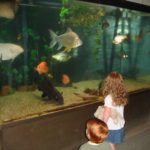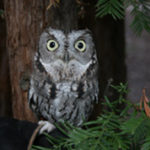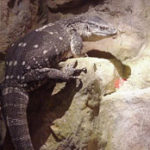Kids looooooove animals! Don’t they?? You can never go wrong taking your little ones to check out any of these places…
CAPITOL AQUARIUM

1920 29th Street, Sacramento, CA
(916) 452-5556
Open Daily 10-6
FREE
Capitol Aquarium is a family-owned and operated business, serving the Sacramento area for over 40 years. They feature over 500 sparkling aquariums with a wide variety of healthy fish and saltwater fish, as well as a complete line of products for every aquarium hobbyist. They have a small pond with Koy fish upon entering, where visitors can sit on a bench and feed the fish with fish food from their coin-operated machine.
DISCOVERY SCIENCE/SPACE MUSEUM

3615 Auburn Blvd., Sacramento, CA
(916) 575-3942
Winter hours: (September – June) Tues. – Fri. 12 noon – 4:30 pm,Sat. – Sun. 10 am – 4:30 pm
Summer hours: (July – August) Daily 10 – 5
Weekday admission: Adults $5.00, Youth 13-17 $4.00, Kids 4-12 $3.00, Kids 3 and under FREE
Weekend admission: Adults $6.00, Youth 13-17 $5.00, Kids 4-12 $4.00, Kids 3 and under FREE
Wild Life Shows!
Visit live animals in the Nature Discovery Hall. Birds, mammals, reptiles, and insects are here waiting to help you learn about their fascinating lives and habitats. Wildlife shows are included in your general admission.
All year: 12:00pm and 2:00pm on Saturday and Sunday
Additional shows in July and August: 2:00pm Monday-Friday
STAR ECO STATION
www.ecostation.starsacramento.org/index.html

4465 Granite Drive, Suite 700, Rocklin, CA
(916) 632-8347
Open Fri. 1-5, Sat. 10-4, Sun. 12-4
General Admission $5.00, Infants in strollers FREE
Tours start every hour on the hour. Last tour starts one hour before closing.
Working in collaboration with the U.S. Fish and Wildlife Service and other government and environmental organizations, STAR ECO Station provides a last chance for illegal or abandoned at-risk exotic wildlife. Visitors to the STAR ECO Station experience incredible hands-on lessons of ecology and environmentalism on breathtaking encounter with beautiful tropical birds, exotic reptiles, wildcats and ocean life in a tropical jungle setting. Environmental partnerships enhance the station with 15 discovery exhibits from organizations such as the World Wildlife Fund, US Fish and Wildlife, Surfrider, and Santa Monica BayKeeper’s unique Storm Drain display and walk-thru Kelp Forest.
SACRAMENTO ZOO

3930 W Land Park Dr
(916) 508-5888
Regular hours 9 – 4 Daily
Winter hours (Nov, Dec, Jan) 10 – 4 Daily
Weekday Admission: Adults $9.00, Kids 3 – 12 $6.50, 2 and under FREE
Weekend & Holiday Admission: Adults $9.50, Kids 3 – 12 $7.00, 2 and under FREE
Zoo and Fairytale Town Combination Tickets available
*FREE Admission Day: Dec 24th
*Half-price Admission Day: November 27th
The Sacramento Zoo is home to over 140 native, rare and endangered species. Animals you might see: Black & white ruffed lemur, Chimpanzee, Coquerel’s sifaka, Sumatran orangutan, White-faced saki, White-handed gibbon,
African lion, Jaguar, Snow leopard, Sumatran tiger, Addax, Bongo, Grevy’s Zebras, Retriculated giraffes, Bennett’s wallaby, Giant anteater, Red panda, Two-toed sloth, Reptile House – snakes, lizards, Tree frogs, turtles/tortoises,
Abyssinian ground hornbill, African gray parrot, American flamingos, Bateleur eagle, Buton hornbill, Emu, Great hornbill, Kookaburra, Lady Ross’ turaco, Ostrich.
FOLSOM ZOO

403 Stafford St., Folsom, CA
(916) 351-3527
Regular Hours Tues. – Sun. 10 – 4
Summer Hours (June 1-August 31) 9 – 3
Adults $4.00, Youth 13 – 17 $4.00, Kids 2 – 12 $3.00, Kids 2 and under FREE
*Half-price Admission: The first Tuesday of every month September through February
Since 1963, this small unique California zoo has been providing sanctuary to some very special animals. All are non-releasable. Many were raised, and rejected, as wild pets. Others were injured or orphaned in the wild. Most are native to North America. All have names and personalities, and their individual stories are posted at the exhibits, along with factual, up-to-date information about their species.The distinctive educational focus of the zoo promotes responsible and appropriate behavior toward all animals. The zoo teaches about common and uncommon animals, both wild and domestic, and includes those in between, like feral pigs and wolf-dog hybrids. Zoo programs stress that wild animals don’t make good pets
This is not a “mainstream” zoo. Rather, it is a sanctuary in management and philosophy, except that it is open to the public, for a fee, six days a week. Animals live out their lives here. People who “don’t like zoos” are generally comfortable here.




